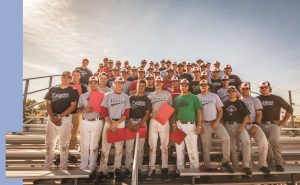Baseball is more than a game. College is more than a class.
And the 50 or so young men who are part of Lethbridge’s Prairie Baseball Academy and who attend Lethbridge College get to experience the truth of both of these statements each year. At the end of their time on the field and on campus, they walk away truly prepared for the future – whether that future involves continuing their education or playing professional baseball.
“It’s a great partnership,” says Joey Underwood, a shortstop from Fruitvale, B.C., who finished 2½ years of studies at the college in December and transferred to Tennessee to continue his studies and play baseball. “When you first come to the PBA, you think you’re here to play ball. You learn very, very quickly that school comes first. And you need that to move on, whether you’re playing baseball or going to school.”
The college and academy have been working together since 1995 on a unique partnership that provides Canadian baseball players the chance to prepare to play college baseball in the United States and possibly go on to play professional ball.
“For a Canadian kid to go from high school to a college south of the border was hard to do, so the PBA was started to help these kids bridge from high school to college ball,” says Todd Hubka, who has spent 17 years with the PBA and is in his third year as head coach. “The college jumped on board with us a few years after we started.”
Between 40 and 60 young men take part in the academy each year. While a handful attend the University of Lethbridge, the majority attend the college as regular, full-time students. Players are recruited from across Canada, with many coming from the Maritime provinces. After finishing up two or three years here, dozens go on to North American colleges and universities to continue their studies and play baseball. More than three dozen former PBA players have gone even farther, spending at least a year playing professional baseball.
“It’s an easy road for kids planning on playing college ball in the United States,” says assistant coach Ryan MacDonald (Computer Information Technology ‘07). “We explain that they won’t get their four-year degree during their time in the PBA, so why not go to the college, get good grades and get a scholarship. They take General Studies courses and can transfer them into any degree they take later in life.”
On the college’s end, the students receive dedicated academic advising and help planning for a four-year degree. Much of that aide comes from Natasha Buis Deering (Community Services and Therapeutic Recreation, General Studies ‘96), the college’s manager of Academic Advising and Recruitment.
“We encourage them when they’re not doing well in class, give pep talks to the players when they need them and to the parents when they need them, too,” says Buis Deering. “We work as a liaison as they work to transfer to four-year institutions. We work hard to teach the students how to balance school and athletics. We talk about time management, and making a commitment to their education.”
The PBA, as Underwood explained, places a great emphasis on academics.
“The students have to perform academically if they want to play,” Buis Deering says. “I have seen them send home the best players if the academics aren’t there.” MacDonald agrees that “academics come before athletics. We’ve kept kids on the roster because of their good work ethic.”
The college benefits by having a more diverse campus. As Hubka explains, “Before PBA, how many Maritime kids came to Lethbridge College?” And the players make the campus a more energetic place, Buis Deering adds. “It certainly helps build on our brand as a world-class institution when it comes to recruiting out-of-province,” she says.
Travis Steinke, a catcher from Red Deer, says the opportunities the college and PBA provide together are second to none.
“The people at the college and the PBA make this program what it is,” says Steinke. “They’re always on the same page. They’re always working to make the players better, both on and off the field.”
Buis Deering says she truly enjoys working with the players.
“I see them move here as young boys with more swagger than you could shake a stick at,” says Buis Deering. “I watch them over their two or three years here evolve into incredible young men who take responsibility for their educational endeavours as much as they do their athletic ones. I like to believe that I play a small role in helping them grow up into the amazing young men they become.”


